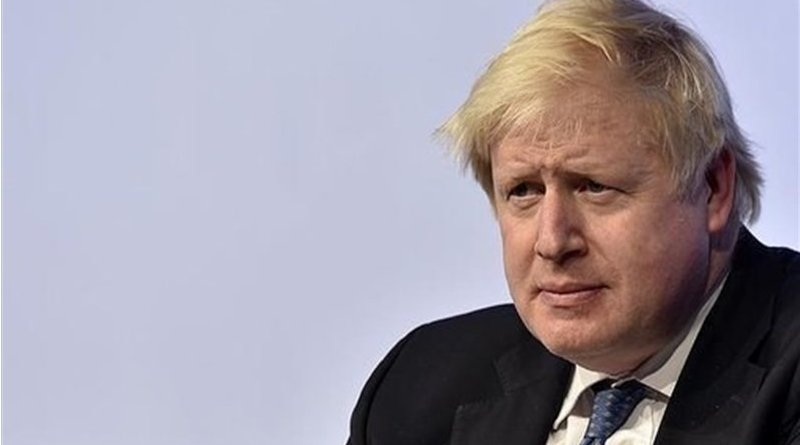Deja Vu: Boris Johnson’s Brexit Hinges On Irish Border Issue – OpEd
By Duncan Bartlett
Britain’s former prime minister David Cameron once had the idea to find out how the nation was feeling emotionally.
He instructed researchers from the Office of National Statistics to ask people to assess their level of life satisfaction, by rating it on a scale from one to ten.
This exercise became known as the “happiness index.” It provided a light-hearted diversion in the days before the referendum on Britain’s membership of the EU darkened the national mood and ended Mr Cameron’s political career.
At the time, 2016, most Britons reported being reasonably content with their lot. The statisticians claimed that Northern Ireland was the happiest region of the UK, as people there ranked their average life satisfaction as 7.85 out of 10.
The Troubles
When the press saw the results, they were puzzled that this rather arbitrary survey did not seem to account for the pain caused by deep social division in both Northern Ireland and its southern neighbor, the Republic of Ireland.
It is a region where people have been divided over politics, religion, and national loyalty for hundreds of years. And until about twenty years ago, the divisions stoked a violent conflict and a terrorist campaign known as “The Troubles.”
More than three thousand people lost their lives and tens of thousands more were injured. It was a terrible time for the people living on the island, including members of my own family. In the early 1970s, my uncle, a restaurant owner in Belfast, was held at gunpoint by the IRA, who then destroyed his business with a bomb.
Fortunately, the violence has subsided, although it has not completely disappeared. A few terrorist splinter groups still hold to the IRA’s ideology that Northern Ireland should unite with the South. My uncle’s restaurant reopened a few weeks after the bombing and continues to trade to this day. But the traumas of the Troubles have sunk into people’s memories and now affect the crucial issue facing the European Union; the threat of a no-deal Brexit with the United Kingdom.
The last line
Mr Johnson’s goal is to take Britain out of the EU by the end of October, with Northern Ireland included in the Brexit deal. This leaves the problem of the border with the South, which runs for hundreds of miles through rural terrain, mainly used for grazing sheep and cattle.
At the moment, people move freely across this invisible line. But after Brexit, the official status of the two parts of the island will change and something will need to be done about the customs arrangements.
This dilemma has turned into a Gordian knot, which Mr Johnson would desperately like to untangle. He recently wrote a letter to the EU Commission chief, Jean Claude Junker, in which he referred to the Irish issue. “Our predecessors have tackled harder problems; we can surely solve this one.”
Yet for the time being, a solution seems out of reach. Political strife remains intense, although fortunately there is only a small risk of a return to widespread terror and violence.
Compromise approach
Mr Johnson has presented the EU with a plan which retains a customs border between the North and the Republic but which proposes that customs checks on goods are conducted electronically, rather than at border checkpoints controlled by police or soldiers. This rankles the Republic of Ireland’s prime minister Leo Varadkar, who believes any kind of border checks are unacceptable.
Mr Johnson says the proposals and constructive and reasonable and insists the only alternative is “no deal.” But there is little to suggest the Irish or their EU partners will come to an agreement with the UK. Even if they do, Mr Johnson will still need to get the deal through the Houses of Parliament in London, where his government no longer has an overall majority.
Moving forward
There is still hope.
The European side does not want to give the impression that it is to blame if no deal is reached, nor does it want people to think that it has rejected a perfectly reasonable compromise. Therefore, the EU’s diplomats talk about “positive advances” – although the European Parliament has already warned the proposals are “problematic.”
When Mr Johnson’s predecessor Theresa May was involved in the negotiations, there were many topics which caused disagreement between Britain and the EU. Now it all rests with this one issue of the Irish border.
Mr Johnson is hoping that he can convince Jean Claude Juncker and his team to enter an intense negotiation period of about ten days, during which the two sides would say nothing to the outside world. This is known as “going into a tunnel.” Mr Juncker says he’s open to talks but the terms on which he’ll negotiate are ambiguous.
Deal or no deal
Well-paid experts have nearly given up trying to predict the outcome of such talks. One financial institution, Deutsche Bank, says there’s a 50-50 chance of a no deal, which sounds like sitting on the fence.
In the meantime, life in most parts of the UK continues as normal. Students study hard, football supporters sing loudly outside pubs, and chefs serve chips with curry sauce.
And many British people can still say that they are happy, despite the Brexit debacle. But if a person with a clipboard were to ask Mr Johnson to rank his life satisfaction on a scale of one to ten, it seems certain that the stressful Irish problem would bring down the score of his happiness index.
This article was published by Geopolitical Monitor.com

